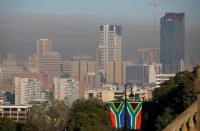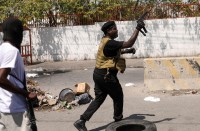by Menna Zaki and Abdelmoneim Abu Idris Ali
KHARTOUM, Sudan (AFP) — Sudanese protest leaders Sunday suspended talks with military rulers, after the army failed to meet their demand for an immediate transfer to civilian rule.
The protest leaders had planned to name members of a civilian body to take over from the ruling military council which took power on April 11 after ousting veteran leader Omar al-Bashir.
The momentum had been building all day Sunday as a sea of protesters waited outside army headquarters for the planned unveiling of the civilian council, but by nightfall it was clear it would not happen.
“We are suspending our talks with the military council,” Mohamed al-Amin, a spokesman for the protest movement, told the tens of thousands of protesters gathered at the army complex.
He said the weeks-long sit-in will continue, and accused the military council of being little different from Bashir’s ousted regime.
“We call for escalating and continuing the demonstrations until the demands are met,” said Amin.
“We are treating the military council as an extension of the regime.”
Wagdi Saleh, a leading figure of the protest movement, blamed the military rulers for the delayed unveiling of a civilian council.
He said that during talks on Saturday “the military council had shown its dark side.”
“The chief of the council’s political committee told our delegation that they are still considering our demand among 100 other demands from other political parties.”
Madani Abbas Madani, a spokesman for Alliance for Freedom and Change, said late Sunday a “sovereign council, a government and a legislative body” would be announced “within days” by protest leaders.
The crowds responded by continuing to sing and dance, holding their mobile phones aloft, as the torches on their devices created a sea of light and speakers churned out nationalist songs.
“High! High! Sudan is up high,” they chanted.
“Our revolution is civilian and protected by the people,” they vowed.
‘Power to the people’
Earlier Sunday new military ruler General Abdel Fattah al-Burhan vowed he was committed to handing power to the people, and pledged to respond to the demonstrators’ demands within a week.
The military council has been put in place for a planned two-year transition period.
“The council is committed to give power to (the) people,” Burhan insisted, in his first interview on state television since taking power.
But he later hit out at protesters for erecting road blocks.
“I condemn the blocking of roads and searching people without authority,” he told senior army officers, according to the military council.
“It can’t continue like this because security is the responsibility of the state,” Burhan said.
Protesters have set up their own make-shift checkpoints to frisk people who come to the protest site where they have been encamped since before Bashir’s ouster.
Burhan on Sunday also confirmed that cash worth over 113 million dollars had been seized from deposed president Omar al-Bashir’s residence.
He said a team of police, army and security agents found a cash haul including seven million euros ($7.8 million), $350,000 and five billion Sudanese pounds ($105 million) during a search at Bashir’s home.
Saudi Arabia and the United Arab Emirates meanwhile offered $3 billion on Sunday in financial aid to the cash-starved country.
The northeast African nation is one of the world’s most impoverished countries and faces an acute foreign currency shortage — a key factor which helped trigger nationwide protests against Bashir.
‘End military rule’
The Sudanese Professionals Association (SPA), at the forefront of the protests, had said it would unveil its own civilian council by Sunday night.
“All Sudanese people are in favour of the council to be announced by the SPA,” Romaysaa Omar, one of the protesters at the sit-in area, told AFP.
On Saturday, protest leaders and the military rulers held talks about a power handover and had initially agreed to continue discussions.
The two sides have struggled to agree on the shape and form of a civilian leadership.
“What we want from them (the military) is a timetable to hand over power, so things don’t drag on,” said Ahmed al-Rabia, a leader of the umbrella group of unions for doctors, engineers and teachers.
Protest leaders say the civilian council would form a transitional government to rule Sudan for a four-year term, followed by elections.
“All we hope for is to be ruled by civilians and get rid of the military rule,” said protester Ehsan Abdallah.
The military council has made some concessions to the protesters by agreeing to demands such as detaining Bashir and releasing many political prisoners and demonstrators.
© Agence France-Presse







